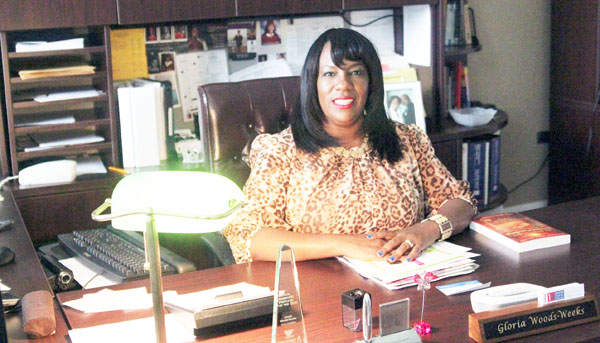Some high school students who enroll in the Josephine Dobbs Clement Early College High School might think they can coast, but the first lesson they’ll be learning is that coasting is not in the curriculum.

Early College Principal Gloria Woods-Weeks in her office in the Robinson Science Building. Photo by Jasmine Holeman
Desiree’ Lewis, a senior in Early College double majoring in psychology and Spanish with a minor in business and liberal studies, said she loves the freedom college students are given, but that freedom has its risks.
“It’s kind of better having high school classes because you are more restricted and on a schedule, but on campus you must have time-management,” Lewis said.
Nelly Esperanza is a junior who plans on majoring in biology. She said the teaching styles of university foreign language professors are different from early college teachers.
“They’re very different simply because I feel as if now in the foreign language that I’m taking — which is French — I’m pretty much teaching myself how to speak it with the help and review of my professor,” Esperanza said.
Esperanza said she’s mostly learning pronunciation and translation. She said high school foreign language classes were much easier because she speaks Spanish fluently.
Students in Early College typically take two years of high school classes and two years of free college credits. The students then transition from either being a high school junior or senior to being classified as a college freshmen or sophomore on campus.
For students to stay in Early College they must maintain a GPA of 2.0 or above. If the student falls below the GPA requirement, they may be sent back to their district school.
If a student fails a college course, their parents will have to pay for the student to retake it. If they don’t pay, the student cannot advance.
A student’s advancement depends on the student’s performance throughout their time in school.
Darrick Wiggins is a junior who plans to join the military.
“I’m trying to pass all of my courses the first time. I want to get in and get out,” Wiggins said.
Principal Gloria Woods-Weeks is notified if any student is failing and takes the appropriate actions.
Woods-Weeks said the students have a support system to guide them through the transition.
“What we like to do is employ a comprehensive suite of support,” Woods-Weeks said.
“These are early inventions so what I do is target the student who will need extra help and time either in academics, non-academics or post-secondary transition,” she said.
Juniors have to schedule regular office visits with their professors and the seminar teacher. Juniors also have to meet with their professors once before midterms and before finals.
They meet with the seminar teacher twice a week. The seminar teacher provides help through tutorials that are taught by other students.
The school provides applications for scholarships and grants. All early college students must still take required college interest programs including The PSAT, SAT and ACT.
Early College students can participate in activities or clubs at N.C. Central University, excluding sports, sororities and fraternities.
Esperanza said she’s interested in joining the drama club and possibly the choir.